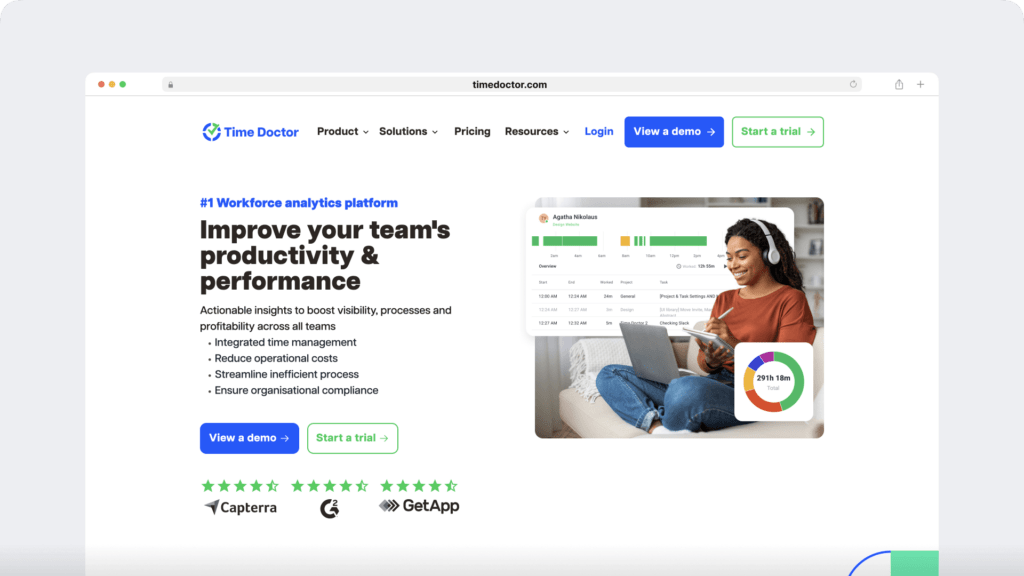Regulatory compliance in call centers helps prevent unethical business practices and promotes a greater customer experience.
Nevertheless, as call centers are subject to several regulations, it may well be difficult to remain updated on each, leading to call center compliance issues.
In this text, we’ll explore 10 common call center compliance issues and why staying compliant is significant. We’ll also highlight 4 useful suggestions to maintain your enterprise compliant.
Table of Contents
Let’s dive right in.
10 common call center compliance issues
Call center compliance is a set of regulations and standards that decision centers must follow to make sure fair practice and data security. It covers a spread of compliance requirements, including cybersecurity, customer protection, and best management protocols.
Sounds necessary, right?
So let’s take an in depth take a look at ten call center compliance issues that you simply might face:
1. Recording and monitoring calls without consent
Countries like Australia and the USA require the consent of each call center agents and customers to watch and record calls.
Whether it’s inbound calls or outbound calls, the decision center needs to reveal that the calls shall be recorded and monitored and that customers can opt out in the event that they’re uncomfortable.
This is very necessary for those who’re using agent performance monitoring software, as some countries have telemarketing laws that prohibit eavesdropping. So if a supervisor listens to the decision without permission, it may well be a compliance risk.
Moreover, to get consent from agents, every worker should sign “notice and consent” documents that confirm their agreement.
Lastly, you could audit recorded calls as soon as possible to realize worthwhile insights into customer interactions.
2. Violating outbound dialing restrictions
Regulatory bodies similar to the TCPA (Telephone Consumer Protection Act) lay down certain directives on outbound calls to make communication with customers more agreeable.
A few of these TCPA directives include:
- Telemarketers cannot use automatic dialers to contact wireless phones.
- Customers can withdraw their consent in any reasonable way, at any time.
- Call center agents cannot call people using reassigned (a number reissued to a brand new customer) phone numbers without prior consent.
- AI and pre-recorded telemarketing calls are prohibited.
- Agents must exclude numbers on the Federal Do Not Call Registry (DNC).
- Customer interaction must only occur between 8 AM to 9 PM of the caller’s local time.
- Agents must tell customers who they’re and why they’ve called.
Nevertheless, you need to use timezone management tools, create your personal DNC list, and continuously update your call list to fulfill compliance regulations.
3. Calling numbers on the DNC list
Some countries like Singapore and India have a national DNC where people can add their phone numbers in the event that they don’t wish to receive telemarketing calls.
Call centers and BPO providers that violate this registry are liable to pay heavy fines as much as $40,000 per violation.
To eliminate the chance of non-compliance, you may:
- Subscribe to relevant national and state DNC lists.
- Create your personal denylist for patrons who revoke calling consent.
- Delete DNC and delisted numbers out of your calling database.
4. Recording payment information
PCI-DSS (Payment Card Industry Data Security Standard) prohibits call centers and phone centers from capturing sensitive bank card data like CVV, PINs, and magnetic stripe information.
This regulation applies to any type of communication (verbal, written, or electronic) which will happen during a call.
To make sure PCI compliance, you may:
- Provide tools with a “pause recording” functionality.
- Use an API fix that robotically pauses recording when entering bank card information.
- Offer “touch-tone” dialing and tone suppression functionalities to customers for entering bank card data.
- Implement rules that prevent agents from noting down cardholder data on paper.
5. Sharing health data
Government bodies establish health information protection acts similar to HIPAA (Healthcare Insurance Portability and Accountability Act) to ban the exposure of patients’ health data.
To make sure HIPAA compliance, you may increase your network security and permit only authorized access to your private communications network.
You may also use a cloud service provider that gives administrative and technical controls in case your call center transmits medical information.
6. Allowing unrestricted network access
PCI compliance requires call centers to assign unique agent login IDs to access campaign and customer information.
It also helps managers and regulatory organizations trace the source of knowledge leaks or thefts if needed.
Furthermore, you may assign unique IDs with tiered permissions and security clearance based on agent roles. For instance, you may enable two-step or single sign-on authentication when distant agents access sensitive data.
7. Lacking communication protocols
Call center agents should all the time speak calmly and use non-violent language on inbound calls and outbound calls.
Nevertheless, in case your call center deals with debt collection, the situation can escalate easily and develop into an integrity and compliance risk.
To safeguard consumers against unethical practices, some countries have regulations for call centers and BPO providers coping with debt collections. For instance, the FDCPA (The Fair Debt Collection Practices Act) mandates that debt collectors must not harass, oppress, or abuse defaulters while fulfilling their duty.
8. Network security flaws
Regulatory bodies make corporations liable to guard customer and cardholder data.
This is applicable to call centers, too, as they manage large volumes of sensitive information.
To take care of PCI DSS compliance, you need to have effective network security measures in place similar to:
- Install a firewall.
- Utilize anti-malware and anti-virus software.
- Encrypt sensitive data during transmission.
- Track and monitor all access to your network.
- Test networks commonly to evaluate security risks.
9. Failing to guard customer data
In response to HIPAA regulations and other mandates in numerous countries, call centers must protect specific sorts of customer information, like:
- Social Security numbers.
- Images of shoppers’ faces.
- Geographical identifiers.
- Account numbers.
To remain compliant, you may install network firewalls, anti-virus, and other security tools.
Nevertheless, a more practical way can be to remove sensitive data out of your call or contact center environment. You possibly can do that through de-scoping, which involves automating payment processes or outsourcing payment services to a PCI-DSS standard service provider.
De-scoping ensures that your call center doesn’t are available in contact with or store sensitive data. It also eliminates the price of latest technology to guard customer data and maintain regulatory compliance.
10. Ignoring GDPR guidelines
Call centers interacting with European Union residents must comply with the General Data Protection Regulation (GDPR).
This involves:
- Explicitly receiving consent before recording.
- Presenting valid reasons for call recording and storing customer data.
- Ensuring that EU customers can easily retrieve their data on request at no charge.
To be GDPR compliant, you may create a call center privacy policy for patrons with a GDPR addendum that describes the way you comply with its regulations.
That’s a protracted list of things that you could care for to remain compliant. And while it may well be difficult, call center compliance is vital.
Let’s take an in depth take a look at why regulatory compliance is required.

Why is call center compliance necessary?
Listed here are two key advantages of call center compliance:
1. Helps avoid fines and penalties
Call centers may be held liable to pay steep non-compliance fines to government organizations just like the FTC (Federal Trade Commission) for any data breach.
As an illustration, Equifax, a consumer credit reporting agency, was ordered to pay a $700 million settlement when hackers stole bank card data.
Nevertheless, it’s not simply in regards to the monetary penalty.
Any superb or penalty can damage your enterprise’s fame and break your customers’ trust. It will possibly even have a devastating impact in your revenue.
2. Builds fame and reliability
Regulatory compliance essentials like consent and data protection are pivotal to winning customer trust and constructing business fame and reliability. It prevents agents from engaging in unethical and unscripted practices that might smash the fame of your organization.
Moreover, higher calling experiences and customer support as a consequence of compliance can boost customer satisfaction and the fame of your call center.
Clearly, compliance is significant.
So, let’s take a look at how you may easily manage compliance issues.

4 proven suggestions to maintain your call center compliant
Listed here are 4 useful tricks to provide help to keep your call center compliant:
1. Provide routine agent training
Regular training helps your agents stay updated with relevant call center policies and practices.
These programs could cover communication guidelines in addition to relevant compliance requirements issued by federal and state laws and other regulatory bodies. You may also provide hands-on sessions for brand spanking new tools.
This may enable agents to deliver a smooth and secure calling experience to customers.
2. Use tools that aid call center regulatory compliance
Listed here are a number of tools and resources that may aid regulatory compliance:
A. Time tracking
In response to FSLA (Fair Labour Standards Act), call centers must record information on wages and hours worked — which makes time tracking essential.
Furthermore, time tracking will help managers discover time-consuming tasks, enabling them to take the precise steps to spice up overall call center productivity.
But how do you track your agents’ work hours?
With this robust tool, agents can track time for all their work activities. You possibly can monitor and review worker activity through a spread of accurate reports on website and application usage.

B. Calling automation
Using call center software that automates the storage and cataloging of call recordings will speed up the auditing process and provide help to easily spot compliance issues.
You may also use a predictive dialer that predicts when agents shall be available and robotically sets up one other call — reducing agent idle time.
Nevertheless, you need to avoid using automation for prerecorded calls as they’re prohibited for telemarketing purposes.
Explore the preferred sorts of call center automation.
C. Quality assurance scorecards
QA scorecards are an important quality monitoring resource that enables team leaders to grade an agent’s interaction with customers.
A QA scorecard built for compliance check can immediately track and flag lapses in your compliance regulations. These tools may also track compliance performance on calls and alert managers about issues.
For more information, take a look at this in-depth guide on call center quality assurance.
D. Customer relationship management (CRM)
CRM tools not only enhance customer experience but help telemarketers maintain call center compliance.
They’re especially effective in securely recording and managing customer information. This information can be easily retrievable, as required by the GDPR.
CRMs also automate call center processes like loading account history and customer data – providing smoother calling experiences and customer support. These functions are programmed to fulfill regulatory compliance guidelines as well.
Furthermore, they may be tailored to your data security needs.
3. Maintain a call center compliance checklist
Compliance is a continuous process that involves staying ahead of assorted regulations. An easy checklist can make sure you don’t forget the necessary steps.
Here’s what you may include:
- Ensure network security with an activated firewall, anti-malware and anti-virus software, and extra safety protocols.
- Encrypt payment and bank card information to prevent data breaches and be PCI compliant.
- Keep a log of abandoned call rates to your predictive dialer.
- Update call center software and applications to their latest version to avoid vulnerabilities.
- Generate unique IDs with specific levels of access in line with your agents’ roles.
- Test network security commonly to discover weak points in your security.
- Delete DNC phone numbers out of your calling database.
- Address guidelines for communication and telemarketing practices on calls.
- Confirm GDPR compliance.
- Safeguard protected health information.
4. Create a call center security policy
With agents bringing their cell phones or other personal devices to work and possibly working from distant locations, call centers have to draw up a security policy informing agents of operations’ protocols and rules.
A security policy will help employees understand the results of compliance violations and data breaches.
Try this guide to create an efficient call center security policy.
Wrapping up
Compliance issues can’t only result in security concerns like a knowledge breach but additionally impact your organization’s fame. That’s the reason you need to keep track of relevant regulations and maintain a secure environment to your customers and agents.
Undergo this text to realize a deeper understanding of common compliance issues and the way you may stay compliant.
